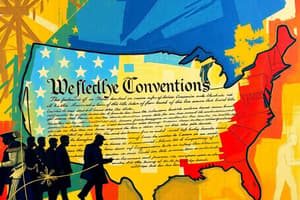Podcast
Questions and Answers
What was the main reason behind the British colonies' idea to unite and become one country?
What was the main reason behind the British colonies' idea to unite and become one country?
- To increase their economic independence from Britain
- To protect themselves from a potential USA invasion (correct)
- To create a new form of government
- To gain more power and take over Britain
What happened to the free trade between Britain and the British colonies after 1846?
What happened to the free trade between Britain and the British colonies after 1846?
- It was restricted to only a few colonies
- It was cancelled by Britain (correct)
- It remained unchanged
- It became more prosperous
Why did the colonies start trading with each other and paying taxes?
Why did the colonies start trading with each other and paying taxes?
- To reduce their dependence on Britain
- To find an alternative to the cancelled free trade with Britain (correct)
- To increase their financial burden
- To prepare for a potential war with the USA
What was the main obstacle to building a railroad system across the colonies?
What was the main obstacle to building a railroad system across the colonies?
What was the stance of the Little Englanders towards Canadian Confederation?
What was the stance of the Little Englanders towards Canadian Confederation?
What was the main reason behind the political deadlock in the government?
What was the main reason behind the political deadlock in the government?
What was the main reason behind the push for Canadian Confederation in the 19th century?
What was the main reason behind the push for Canadian Confederation in the 19th century?
What was the significance of the Trent Affair in 1861?
What was the significance of the Trent Affair in 1861?
What was the purpose of the Fenian Raids in the 1860s?
What was the purpose of the Fenian Raids in the 1860s?
What was the outcome of the Reciprocity Treaty signed in 1854?
What was the outcome of the Reciprocity Treaty signed in 1854?
Who negotiated the Reciprocity Treaty of 1854?
Who negotiated the Reciprocity Treaty of 1854?
What was the role of Lord Elgin as the Governor General of Canada?
What was the role of Lord Elgin as the Governor General of Canada?
Flashcards are hidden until you start studying
Study Notes
Fear of Attack and Economic Concerns
- British colonies feared invasion by the USA and considered uniting to protect themselves, as the USA wouldn't be able to attack all of them at once.
- The cancellation of free trade with Britain in 1846 led to economic crisis in Canada, prompting the colonies to trade among themselves and consider forming a single country to avoid tariffs.
Transportation and Economics
- Building railroads to connect the colonies would be expensive, but dividing the costs among them would make it more affordable.
British Attitudes and Canadian Autonomy
- The Little Englanders in London advocated for Canadian self-governance to reduce Britain's financial and administrative burden.
Political Deadlock and Confederation
- The government and opposition were evenly divided, leading to a political deadlock, which John A. Macdonald and George-Étienne Cartier sought to overcome by uniting the provinces into a single federal system.
Threat of American Expansion
- The concept of Manifest Destiny and American expansionism raised concerns about a potential takeover, prompting Canadian leaders to push for Confederation as a means of defense.
Inciting Incidents
- The Trent Affair (1861) and the Chesapeake Incident (1807) highlighted Canada's vulnerability to U.S.-British conflicts and the need for stronger defense through Confederation.
- The St. Albans Raid (1864) and the Fenian Raids (1860s) further emphasized Canada's security weaknesses and the need for better border security and ultimately Confederation.
Economic Factors and the Reciprocity Treaty
- The Reciprocity Treaty (1854) boosted trade between the Province of Canada and the United States, but its termination in 1866 led to a recession, highlighting the need for economic stability and diversification through Confederation.
Studying That Suits You
Use AI to generate personalized quizzes and flashcards to suit your learning preferences.




